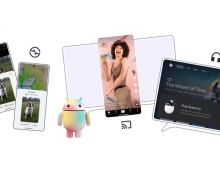
Microsoft Attack's Google User Data Policy, Google Responds
Microsoft slammed search rival Google with newspaper ads Wednesday, saying that recent changes at Google that allow it to merge the data it collects on user activity across services such as YouTube and Gmail are meant to allow advertisers to better target customers.
Google has announced changes in its user policies last week saying that they would provide 'a better user experience.'
Microsoft's ads appeared in newspapers including USA Today, The Wall Street Journal and The New York Times.
"Every data point Google collects and connects to you increases how valuable you are to an advertiser," Microsoft says in the ad:

In response, Google published a blog post in which it refuted what it called "myths" about its new privacy policy.
"Google does not sell, trade or rent personally identifiable user information. Advertisers can run ads on Google that are matched to search keywords, or use our services to show ads based on anonymous data, such as your location or the websites you've visited," Google said.
Google added that its privacy controls have not changed, and the company's users can edit and delete their search history; edit and delete their YouTube viewing history; use many of our services signed in or out; use Google Dashboard and our Ads Preferences Manager to see what data we collect and manage the way it is used; and take advantage of our data liberation efforts if they want to remove information from our services.
Google adeed that "the vast majority of the product personalization Google does is unrelated to ads - it's about making our services better for users. Today a signed-in user can instantly add an appointment to their Calendar when a message in Gmail looks like it's about a meeting, or read Google Docs within their email."
Responding to Microsoft's claim that Google reads users'email, the company does not dispute that it serves up ads based on words in private emails written by users of Gmail. "Google computers scan messages to get rid of spam and malware, as well as show ads that are relevant to users," Google says.
Both companies offer several controls to prevent advertisers from tracking users' online activity.
What actually changed in Google's New privacy policy
After a letter from eight Congress Representatives to Google, the company provided straightforward answers to the public about their new policy.
According to Google, up until March 1, 2012, the data Google collected on you when you used YouTube was carefully cabined away from your other Google products. So, in effect, Google could use data they collected on YouTube to improve and customize the users' YouTube experience, but couldn't use the data to customize and improve user experience on, say, Google+. The same siloing took place for your search history. Previously, Google search data was kept separate from other products. Even when users were logged in, Google promised not to share the information they gathered about you from your Google search history when customizing their other products. Considering how uniquely sensitive user search history can be (indicating vital facts about your location, interests, age, sexual orientation, religion, health concerns, and much more), this was an important privacy protection.
The new privacy policy removes the separation between YouTube, Google search, and other Google products.
Google's policy's overview page reads:
"Specifically, our policies meant that we couldn't combine data from YouTube and search history with other Google products and services to make them better. So if a user who likes to cook searches for recipes on Google, we are not able to recommend cooking videos when that user visits YouTube, even though he is signed in to the same Google Account when using both."
For individuals who would like to continue using Google products, but want to create some type of silo between Google search, YouTube, and other products, there is an option to set up multiple Google accounts. Users can set up two or more accounts as long as they have different Gmail addresses; however, individuals using this strategy to protect their privacy should be careful not to commingle-consider using separate browsers for each of your Google accounts. Unfortunately, this is a somewhat laborious process.
Microsoft's ads appeared in newspapers including USA Today, The Wall Street Journal and The New York Times.
"Every data point Google collects and connects to you increases how valuable you are to an advertiser," Microsoft says in the ad:

In response, Google published a blog post in which it refuted what it called "myths" about its new privacy policy.
"Google does not sell, trade or rent personally identifiable user information. Advertisers can run ads on Google that are matched to search keywords, or use our services to show ads based on anonymous data, such as your location or the websites you've visited," Google said.
Google added that its privacy controls have not changed, and the company's users can edit and delete their search history; edit and delete their YouTube viewing history; use many of our services signed in or out; use Google Dashboard and our Ads Preferences Manager to see what data we collect and manage the way it is used; and take advantage of our data liberation efforts if they want to remove information from our services.
Google adeed that "the vast majority of the product personalization Google does is unrelated to ads - it's about making our services better for users. Today a signed-in user can instantly add an appointment to their Calendar when a message in Gmail looks like it's about a meeting, or read Google Docs within their email."
Responding to Microsoft's claim that Google reads users'email, the company does not dispute that it serves up ads based on words in private emails written by users of Gmail. "Google computers scan messages to get rid of spam and malware, as well as show ads that are relevant to users," Google says.
Both companies offer several controls to prevent advertisers from tracking users' online activity.
What actually changed in Google's New privacy policy
After a letter from eight Congress Representatives to Google, the company provided straightforward answers to the public about their new policy.
According to Google, up until March 1, 2012, the data Google collected on you when you used YouTube was carefully cabined away from your other Google products. So, in effect, Google could use data they collected on YouTube to improve and customize the users' YouTube experience, but couldn't use the data to customize and improve user experience on, say, Google+. The same siloing took place for your search history. Previously, Google search data was kept separate from other products. Even when users were logged in, Google promised not to share the information they gathered about you from your Google search history when customizing their other products. Considering how uniquely sensitive user search history can be (indicating vital facts about your location, interests, age, sexual orientation, religion, health concerns, and much more), this was an important privacy protection.
The new privacy policy removes the separation between YouTube, Google search, and other Google products.
Google's policy's overview page reads:
"Specifically, our policies meant that we couldn't combine data from YouTube and search history with other Google products and services to make them better. So if a user who likes to cook searches for recipes on Google, we are not able to recommend cooking videos when that user visits YouTube, even though he is signed in to the same Google Account when using both."
For individuals who would like to continue using Google products, but want to create some type of silo between Google search, YouTube, and other products, there is an option to set up multiple Google accounts. Users can set up two or more accounts as long as they have different Gmail addresses; however, individuals using this strategy to protect their privacy should be careful not to commingle-consider using separate browsers for each of your Google accounts. Unfortunately, this is a somewhat laborious process.




















